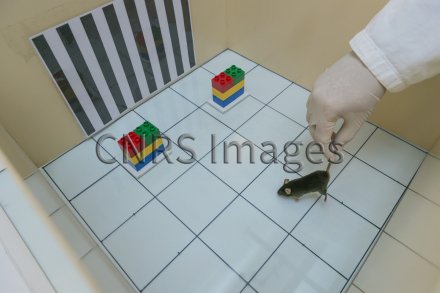Production year
2017

© Cyril FRESILLON/CRCA/CNRS Images
20170048_0021
Mouse being placed in an arena designed to test its spatial memory. The test is based on the capacity of mice to remember the location of objects present in the arena. The first stage involves placing the mouse in the arena with two identical objects so it can familiarise itself with them and learn their position. A striped visual pattern helps the mouse orient itself in the space. To avoid placing the animal under stress, the test environment does not receive direct light. After this first exploratory phase, the mouse is returned to the same arena one hour or several days later to test its short- or long-term memory. For this second session, one of the two objects is moved, introducing spatial novelty. However, the other object is not moved, making it the reference object. A mouse whose memory is intact will show greater interest in the object that has been moved, and will tend to explore it for longer than the reference object. The movements and behaviour of the animal are monitored via camera and analysed using trajectory analysis software. In this way, the arena can be used to evaluate the mnesic capacities of different mouse lines and highlight memory problems, such as in Alzheimer's disease models, for example.
The use of media visible on the CNRS Images Platform can be granted on request. Any reproduction or representation is forbidden without prior authorization from CNRS Images (except for resources under Creative Commons license).
No modification of an image may be made without the prior consent of CNRS Images.
No use of an image for advertising purposes or distribution to a third party may be made without the prior agreement of CNRS Images.
For more information, please consult our general conditions
2017
Our work is guided by the way scientists question the world around them and we translate their research into images to help people to understand the world better and to awaken their curiosity and wonderment.